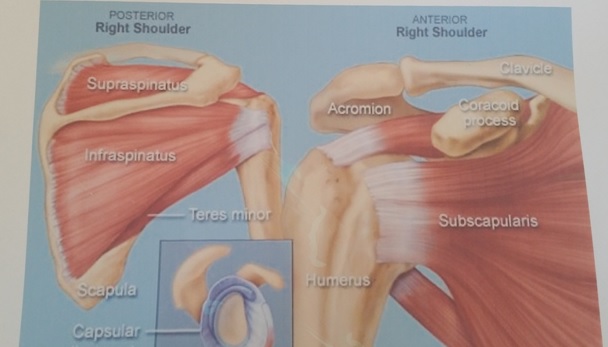Oakville Physio and Rotator Cuff Injuries
Do you have shoulder pain or discomfort? Worried you may have a rotator cuff injury? In the following article our Oakville Physiotherapist will discuss signs, symptoms and types of rotator cuff injuries.
The Rotator Cuff is made up of four muscles:
- Supraspinatus
- Infraspinatus
- Teres minor
- Subscapularis
These four muscles help move and stabilize the shoulder joint. They are dynamic stabilisers and help adjust the position of the humeral head and scapula during movement. Our Oakville physiotherapy clinic treats shoulder injuries everyday!
Damage to any one of the four muscles can occur because of acute injury, chronic overuse and gradual aging.

SIGNS AND SYMPTOMS OF ROTATOR CUFF INJURIES
- Acute or chronic pain
- Decreased range of motion
- Tenderness
- Spasm
- Functional difficulties such as; getting dressed, household maintenance and work related tasks
Pain maybe felt in the front, top or back of the shoulder and there can be difficulties with elevating the arm, reaching behind such as into the back pocket or doing up a bra strap.
The muscles of the rotator cuff maybe damaged in a variety of ways. Damage may occur from an acute injury ei; fall, accident or sports related, chronic overuse or from gradual degeneration with aging.
TYPES OF ROTATOR CUFF INJURIES
Grade 1 Strain
Involves overstretching, overworking of the rotator cuff that sets off the inflammatory process.
Grade 2 Strain or Partial Tear
There is some partial tearing of some of the tendon fibers.
Grade 3 Strain or Complete Tear
In this situation there is a full thickness tear in the tendon.
TENDONITIS/Impingment Syndrome
This is usually a result of long standing inflammation in the rotator cuff tendons with the development of scar tissue. As the arm is elevated there can be a sharp pain from about 90 degrees through to about 120 degrees.
Physiotherapy TREATMENT FOR ROTATOR CUFF INJURIES:
Early intervention is important as it is with any soft tissue injury. An early and accurate diagnosis is critical in order to obtain optimum recovery.
Physiotherapist are regulated health care professionals who can assess, diagnose and treat rotator cuff injuries. NOTE YOU DO NOT NEED TO SEE YOUR DOCTOR FIRST IN ORDER TO SEE A PHYSIOTHERAPIST.
Sometimes further diagnostic testing is needed to determine the extent of the damage to the tissue. These test could include an xray, ultrasound or MRI. YOU DO NOT NEED TO HAVE THESE TEST DONE FIRST IN ORDER TO START TREATMENT.
Once an assessment and diagnosis had been established the physiotherapist can initiate treatment.
Treatment could involve the following:
Acute Grade 1 Strain:
- Ice
- Therapeutic ultrasound
- Laser
- Electrical stimulation
- Acupuncture
- Shockwave Therapy
- Specific exercises
- Manual therapy: graded mobilization, myofascial release, active release.
Tendonitis:
Sometimes rotator cuff tendonitis presents as an acute strain. Treatment for this condition is similar to that of an Acute Grade 1 Strain. Care should be taken with exercises not to aggravate the condititon.
Grade 2 Strain or Partial Tear
Many of the treatment modalities and manual techniques used to treat Acute Grade 1 Strain and Tendonitis can be used to treat a Grade 2 Partial Tear. Care should be taken in the administration of exercises and manual techniques so as to not make the partial tear any worse.
Grade3 Strain or Full Thickness Tear:
With a Full Thickness Tear more often than not a referral is made to an orthopedic surgeon. They will look at all results and discuss whether surgical intervention is warranted. More often than not it is!
After surgical reapair to the Rotator Cuff there is a long period of rehab.
There is a set protocol that must be followed to allow for optimal recovery post surgery.
REHAB FOR ROTATOR CUFF REPAIRS IS EXTENSIVE AND A LOG PROCESS … 6 MONTHS AT LEAST.
Acupuncture For Shoulder Injuries
Acupuncture helps to increase blood flow to injured areas, and help alleviate pain by alleviating nerve irritation. Acupuncture is a safe and effective treatment for painful injuries.
If you suffer from shoulder pain contact our clinic and make an appointment to see our Physiotherapist for an assessment, diagnosis and treatment.